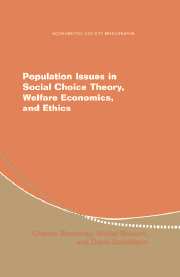Book contents
- Frontmatter
- 1 Introduction
- 2 Measurement of Individual Well-Being
- 3 Welfarist Social Evaluation
- 4 Fixed-Population Principles
- 5 Population Principles
- 6 Characterizations and Possibilities
- 7 Uncertainty and Incommensurabilities
- 8 Independence of the Existence of the Dead
- 9 Temporal Consistency
- 10 Choice Problems and Rationalizability
- 11 Applications
- References
- Author Index
- Subject Index
1 - Introduction
Published online by Cambridge University Press: 05 January 2013
- Frontmatter
- 1 Introduction
- 2 Measurement of Individual Well-Being
- 3 Welfarist Social Evaluation
- 4 Fixed-Population Principles
- 5 Population Principles
- 6 Characterizations and Possibilities
- 7 Uncertainty and Incommensurabilities
- 8 Independence of the Existence of the Dead
- 9 Temporal Consistency
- 10 Choice Problems and Rationalizability
- 11 Applications
- References
- Author Index
- Subject Index
Summary
In discussions of environmental problems, descriptions of histories of the world over the next century or two are often linked to policy alternatives. In these histories, standards of living as well as the size and composition of populations may differ at different times. It might be said, for example, that, if present policies continue, we can expect a large population, low average standards of living, environmental degradation, and wars as the relative scarcity of land increases. On the other hand, if responsible environmental and population policies are adopted, we might be told to expect a smaller population with higher average standards of living and a world with more resources and less environmental damage for subsequent generations.
Other policy decisions have population consequences as well. Examples include the allocation of public funds to prenatal care, the design of aid packages to developing countries, public funding of education, legalization of birth-control devices, resource conservation, expenditures on public health, and the design of social security systems. In addition, individual fertility decisions affect population composition and size both directly and indirectly, as the children have children. In each of these cases, history will depend, to some extent, on actions taken.
- Type
- Chapter
- Information
- Publisher: Cambridge University PressPrint publication year: 2005



